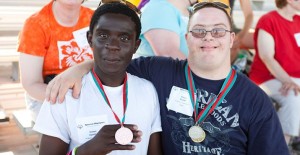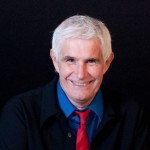The Rose by the Name of “Normal” is not Sweet
 Normally roses smell sweet. This one to the left is called a ‘Sweet Chariot’ rose. And no, it doesn’t swing low but it does smell like pepper and that smell increases in the summertime.
Normally roses smell sweet. This one to the left is called a ‘Sweet Chariot’ rose. And no, it doesn’t swing low but it does smell like pepper and that smell increases in the summertime.
Having watched as much as possible of the Special Olympics World games this week I was struck by a number of things. The first was the number of people around the world said to have ‘intellectual disabilities’ was about 100 Million. I looked it up and found this…
“According to the World Health Organization, up to three percent or almost 200 million people of the world’s population have intellectual disabilities. This is the largest disability population in the world. Intellectual Disabilities knows no boundaries. It cuts across the lines of racial, ethnic, educational, social and economic backgrounds, and it can occur in any family. “
And that’s only the category called “intellectual disability.” I also found this from the World Report on Disability (WRD)
“More than 1 billion persons in the world have some form of disability. This corresponds to about 15% of the world’s population. Between 110-190 million people have very significant difficulties in functioning.”
That’s a lot in either category to be considered “disabled.” Which, as an Evolutionary Coach has made me question the labels we’re using to describe people.
When we use the word ‘disable’ with our computer settings, we are turning a feature on or off. When it’s off, it’s not functioning and when it’s on or ‘enabled’, it is. While we use the word ‘disabled’ slightly differently when addressing people, nevertheless the energy and implication is still there. There’s something unwanted in how it works, or we don’t want it working, period.
Then there is the language distinction around ‘learning disability’, which is often flung at children and even adults. The reason the word is used that way and in other scenarios is our attachment to the arbitrary definition called ‘normal.’
Normal is a function of Context
You may say, well there is some distinction there, it’s true. I would assert there is no truth in the word ‘normal.’ I would assert that it’s situational. What’s ‘normal’ in one context is not in another. What’s ‘normal’ in one time is not in another. I’ll give a range of examples.
- It is normal to eat with your fingers in some cultures and not in others.
- It is normal in the criminal world or some neighborhoods for people to commit crimes and not so in others.
- It is normal in some companies to have command and control leadership and in others it is not, it’s more collaborative.
- It is normal in one religion to sacrifice animals and not in others.
- It is normal in some cultures to naturally share as first priority, (see Ubuntu) because they see themselves in their community as one, while in others, sharing is a secondary impulse to be fed only after the rugged individualism of taking care of oneself is sated.
- It is normal to be physically aggressive on a football field is normal and yet off the field it is not.
- It was normal, in the early south in the U.S. ,to see black people as less than human, in many places today that viewpoint is an aberration.
Normal shifts over time.
Normal is Arbitrary
Normal…is therefore a sliding scale of arbitrary assessment. Remember it was once ‘normal’ to send mail by carrier pigeon. Now anyone who does so would be ridiculed. Orange is the new Black. ‘Normal’ gets imposed on others and is used as a means of inclusion/exclusion. And herein lies the inadequacy of the term.
To assign the term ‘disability’ is to work from a construct arbitrarily designated as to what is normal and anything varying from that is not normal. So abilities assigned to normal register in one way and different abilities or degree of abilities is registered as not normal.
This is sometimes applied in a ‘positive’ interpretation i.e. ‘this person’s ability to do X is beyond everyone else’s, it’s not normal. But those instances are rare. Mostly, below normal is a bad thing. It is dehumanizing in a number of ways. It establishes that there is a standard that anyone who does not meet it, is somehow less. In which case, they must work harder to demonstrate that they are worthy of being included with the ‘normal’ folks.In the case of learning, what’s missed is that even those considered with learning disability can learn. In fact, they may actually learn differently.
Disability or Difference?
I’ve had a client whose son had Asperger’s which is considered to be in the “autism spectrum disorder’ category. The people at his school said he had a learning disability. In one conversation with my client, I challenged that judgment. I asked…”When he plays video games, does he get better?”
“Yes” was his reply. Then I responded with this observation. Perhaps he doesn’t have a learning disability, he has a learning difference. Because in order to get better at anything you have to be able to learn. Which meant, clearly his son could learn and quite easily it appeared. It was just that either the subject matter wasn’t relevant to him, or the manner in which it was presented didn’t match his learning difference.
Both of which were probably true since the U.S. Education system seems to operate with factory mentality of treating all kids as if they are the same when each is perfectly unique and deserves to be addressed that way. But honoring the uniqueness of each child might tax the system’s resources, hence the homogeneous approach common to most schools that says something like, “We must establish a norm then rate people above and below, and then we give rewards to those above said norm while punishing those below with a judgment called ‘disability’ as a label to wear for the rest of their lives.
For more on this perspective shift see this article and this ted talk
Working with What Is
Perhaps, what’s wanted is something that is near and dear to the profession of coaching. It’s the notion of working with the ‘given’ conditions and then seeing what’s possible from there. In this case, the coach understands that difference is more important than what’s been labelled normal or a disability and seeks to leverage the unique expression of life before them.
Coaches seek to honor that something else is going on and on the human level, that something deserves the respect of being looked at without judgment and encouraged to fulfill as best as possible the desire of that client.
Now I began with some numbers…and to me…when the numbers are as high as they are in the world population, it’s time we began to challenge the words we use and begin to see things from difference vs. disability. See things as ‘yes, there are special needs to be taken care of’ but that doesn’t make those who need them less in any way shape or form. In this way, our world citizens can be honored as they are without judgment.
We are all ‘human’
We can afford to shift what we consider ‘normal’ is, and have it simply signal, ‘the usual way in which something like intelligence is expressed’. Then let’s be curious about how each life form’s intelligence is expressed in different ways and honor that difference.
What I witnessed in watching those Special Olympics was people of all ages with many “disabilities”, sharing the same human traits of perseverance, dedication, joy, passion, effort, desire to win, overcoming obstacles (in some cases ridiculous in their scope of just how challenging they were) as we see in the ‘abled’ folk who do sports. In some cases, they showed even more compassion and respect for their competitors, that we see in the trash talking world of professional sports. 
Maybe these Olympics are “Special” for a different reason. Perhaps, just perhaps, there’s an enormous lesson about seeing the humanness in others. Regardless of physical expression or difference we can learn from those we have called ‘disabled.’
Because the way they treated each other was nothing short of true inspiration. I was and am, still deeply moved by what I witnessed.
A bit about Michael

Michael Stratford, MCC is more than an ICF Master Certified Coach. He was a pioneer in the coaching profession. That same questing spirit keeps him curious about the next evolution of coaching and exploring that in his upcoming program, Evolutionary Coach.
He is an active ICF Assessor. Michael is a personal coach, business coach and executive coach, with the common theme of drawing out the uniqueness of each of his clients, so they can use their gifts and talents to further excel in their work and life.
Michael is a playfully engaging speaker, trainer of coaches with an international reputation for thinking outside the box, and evoking a shift in the ‘being’ of each of his clients. His unorthodox thought leadership has been a powerful asset for all his clients when challenging their limitations for success.
Contact Michael on how you might work together.












